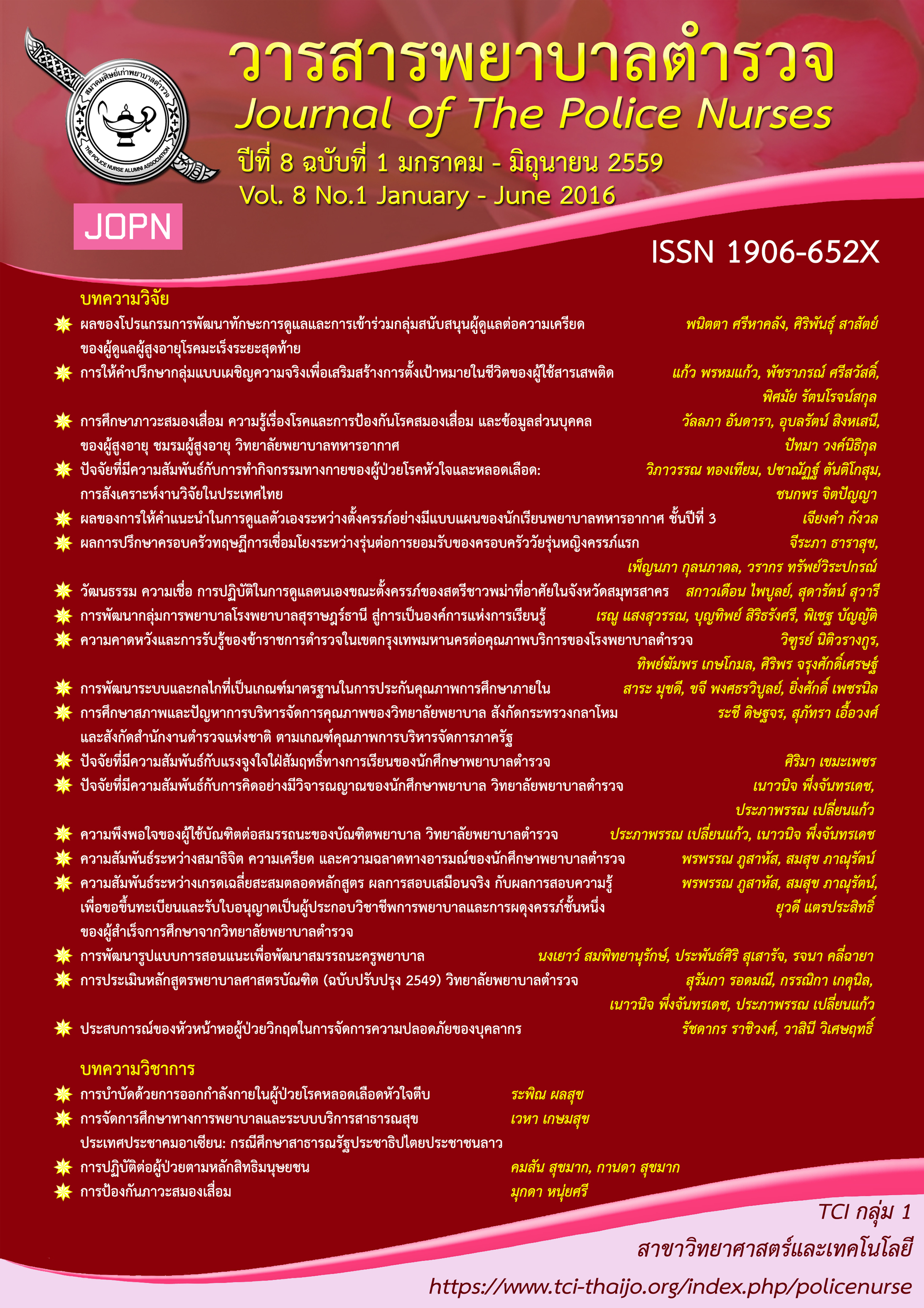ผลของโปรแกรมการพัฒนาทักษะการดูแลและการเข้าร่วมกลุ่มสนับสนุนผู้ดูแลต่อความเครียดของผู้ดูแลผู้สูงอายุโรคมะเร็งระยะสุดท้าย
Keywords:
ผู้ดูแล, ความเครียดของผู้ดูแล, ทักษะการดูแล, กลุ่มสนับสนุนผู้ดูแล, caregiver, stress of caregiver, caregiving skill, support groupAbstract
การวิจัยนี้เป็นการวิจัยกึ่งทดลอง มีวัตถุประสงค์เพื่อศึกษาผลของโปรแกรมการพัฒนาทักษะการดูแลร่วมกับการเข้ากลุ่มสนับสนุนผู้ดูแลต่อความเครียดของผู้ดูแลผู้สูงอายุโรคมะเร็งระยะสุดท้าย ตัวอย่าง คือ ผู้ดูแล ทั้งเพศชายและเพศหญิง ที่ให้การดูแลผู้สูงอายุโรคมะเร็งระยะสุดท้ายที่อยู่ระหว่างการรักษาและนอนพักในโรงพยาบาล จำนวน 40 คน แบ่งผู้ดูแลออกเป็น 2 กลุ่ม คือ กลุ่มควบคุม 20 คน เป็นกลุ่มที่ได้รับการพยาบาลตามปกติ กลุ่มทดลอง 20 คน ซึ่งได้รับการพยาบาลตามปกติ และโปรแกรมที่พัฒนาขึ้น ระยะเวลาศึกษารวม 6 สัปดาห์ เครื่องมือที่ใช้ในการวิจัย ประกอบด้วย แบบบันทึกข้อมูลส่วนบุคคลของผู้ดูแลและผู้สูงอายุโรคมะเร็งระยะสุดท้าย แบบประเมินความเครียดของผู้ดูแล (Caregiver Strain Index: CSI) ค่าความเที่ยงเท่ากับ 0.81 และเครื่องมือที่ใช้ในการทดลอง คือ โปรแกรมการพัฒนาทักษะการดูแลร่วมกับการเข้ากลุ่มสนับสนุนผู้ดูแล วิเคราะห์ข้อมูลโดยหา ร้อยละ ค่าเฉลี่ย ส่วนเบี่ยงเบนมาตรฐาน และสถิติการทดสอบค่าที (Dependent t-test และ Independent t-test)
ผลการวิจัยสรุปได้ดังนี้ 1) ผู้ดูแลผู้สูงอายุโรคมะเร็งระยะสุดท้ายในกลุ่มทดลอง หลังจากที่เข้าร่วมโปรแกรมการพัฒนาทักษะการดูแลร่วมกับการเข้ากลุ่มสนับสนุนผู้ดูแลแล้วมีความเครียดน้อยกว่าช่วงก่อนเข้าร่วมโปรแกรม อย่างมีนัยสำคัญทางสถิติที่ระดับ .05 และ 2) ผู้ดูแลผู้สูงอายุโรคมะเร็งระยะสุดท้ายในกลุ่มทดลอง หลังจากการเข้าร่วมโปรแกรมการพัฒนาทักษะการดูแลร่วมกับการเข้ากลุ่มสนับสนุนผู้แลมีความเครียดน้อยกว่ากลุ่มที่ได้รับการพยาบาลตามปกติ อย่างมีนัยสำคัญทางสถิติที่ระดับ .05
THE EFFECT OF CAREGIVING SKILL DEVELOPMENT AND CAREGIVER SUPPORT GROUP PROGRAM ON STRESS IN CAREGIVERS OF OLDER PERSONS WITH TERMINAL STAGE CANCER
Abstract
This research was the quasi-experimental research which aimed to study the caregiving skill development and support group activity in caregiver program on stress of caregivers who took care aging with terminal stage of cancer. The sample consisted of 40 caregivers, who were divided into two groups, 20 persons in the control group and the others twenty in the experimental group. The caregiver were both male and female who took care the aging with terminal stage of cancer. The aging with terminal stage of cancer were admitted at a Thanyaburi Hospital. The control group received conventional nursing and the experimental group received conventional nursing and combining with caregiving skill development and support group activity for caregiver program. The length of time in Program was 6 weeks. At the end of last week, their stress was evaluated. The research instruments consisted of personal data of the caregiver and aging with terminal stage of cancer and Caregiver Strain Index (CSI). The validity of the instrument was 0.81 carried out. The data were analyzed by mean, percentage, standard deviation, dependent t-test and independent t-test.
The results can be summarized as follows:
1. The experimental group, after receiving the program had statistically significantly lower stress than before receiving the program at the level of .05.
2. The experimental group, after receiving the program had statistically significantly lower stress than the control group at the level of .05.
Downloads
Downloads
Published
How to Cite
Issue
Section
License
ผลงานที่ได้ตีพิมพ์แล้วจะเป็นลิขสิทธิ์ของวารสารพยาบาลตำรวจ















